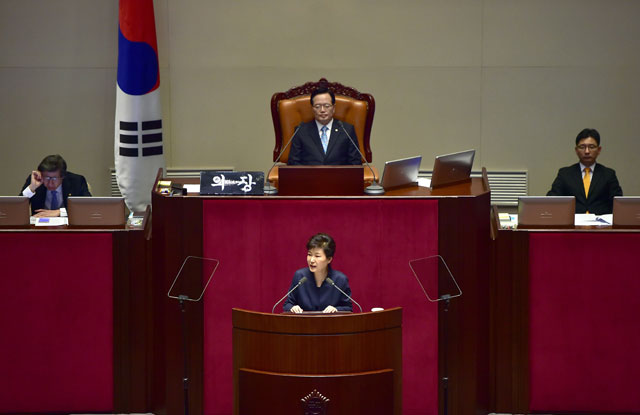
In a speech to the National Assembly, that seemed to have one eye on upcoming parliamentary elections, Park warned that South Koreans had, over the years, become "numb" to the threat from their northern neighbour, and said it was time to take a more courageous stand.
North Korea a ‘threat to the world’: Kerry
The speech came a week after Park took the unprecedented step of shutting down operations at the jointly run Kaesong industrial estate in North Korea, triggering an aggressive response from Pyongyang.
"It has become clear that we cannot break North Korea's will to develop nuclear weapons through existing means and goodwill," Park said.
"It's time to find a fundamental solution for bringing practical change in North Korea and to show courage in putting that into action," she added.
After her speech, the Yonhap news agency cited defence officials in Seoul as saying four US F-22 stealth fighter jets would fly a mission over South Korea on Wednesday in a show of force aimed at Pyongyang
Citing the North's nuclear test last month and long-range rocket launch on February 7, which was widely viewed as a ballistic missile test, Park said it was clear Pyongyang had no intention of discussing denuclearisation.
"If time passes without any change, the Kim Jong-Un leadership -- which is speeding without a brake -- could deploy a nuclear-tipped missile and we will suffer," she said.
China ‘firmly opposes’ North Korean nuclear test: Beijing
Defending the closure of Kaesong, Park said it was "just the beginning" and signalled further steps that she argued were needed to derail the North's nuclear programme.
"The government will take stronger and more effective measures to make North Korea bitterly realise that it cannot survive with nuclear development and that it will only speed up regime collapse," she said.
A similar line is being pushed by the United States and Japan in an effort to secure a strong UN Security Council resolution that will include harsh new sanctions for North Korea.
But Park's speech failed to address the problem the Security Council is having in drafting a resolution that has the support of all five veto-wielding permanent members.
Despite Beijing's annoyance with North Korea's nuclear ambitions and its young maverick leader Kim Jong-Un, its priority has been to prevent chaos on China's border.
As a result, it has resisted punitive measures that might push Kim's regime towards collapse.
In her speech, Park indicated that South Korea should be more willing to act unilaterally if other countries lagged behind.
"We must throw away the impotent feeling of relying on the international community's sanctions ... and mobilise all possible methods to solve the problem ourselves," she said.
South Korea is due to begin talks with the US this week on the possible deployment of an advanced US missile defence system that China and Russia have warned could undermine stability in East Asia.
Defence officials in Seoul and Washington say bringing the Terminal High Altitude Area Defence System (THAAD) to the South has become a clear necessity given the progress North Korea was making on its ballistic missile programme.
North Korea rocket launch may spur US missile defense buildup in Asia
But China sees it as a threat to its own nuclear deterrent and Vice Foreign Minister Zhang Yesui reiterated Beijing's concerns during meeting Tuesday with his South Korean counterpart in Seoul.
"We exchanged views on the THAAD issue and the Chinese side expressed its opposition," Zhang told reporters. "We hope the relevant sides will act prudently."
1732498967-0/Outer-Banks--(1)1732498967-0-405x300.webp)
1732086766-0/BeFunky-collage-(74)1732086766-0-165x106.webp)















COMMENTS
Comments are moderated and generally will be posted if they are on-topic and not abusive.
For more information, please see our Comments FAQ